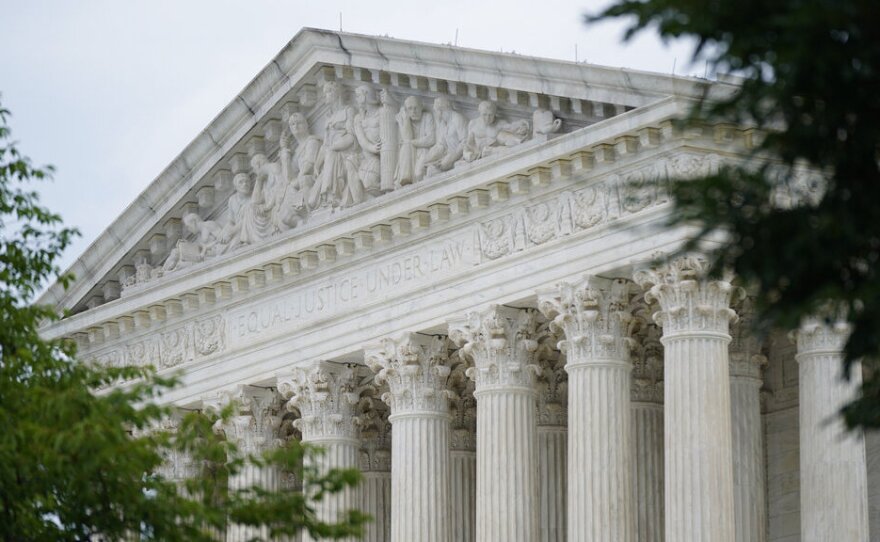California’s status as a safe haven for reproductive rights is in question as the U.S. Supreme Court considers lower-court rulings on access to the FDA-approved abortion drug mifepristone.
The Supreme Court is set to decide by 11:59 p.m. Friday whether access to the drug should stay as is, restricted or banned. The pending decision has women, doctors and California elected officials on edge.
“This is an extraordinary time,” said California Governor Gavin Newsom earlier this week. “As my wife and others have said, this would not be happening to men and boys. That’s a hell of a statement. We are seeing a full frontal assault on women and girls.”
The question of whether mifepristone — part of a two-drug process for medication abortion — should still be available to women. It was brought to question earlier this month by a ruling from a federal judge in Texas.
In that order, U.S. District Judge Matthew Kacsmaryk suspended the FDA’s 20-year-old approval of mifepristone. The ruling would have led to a nationwide ban.
But minutes later, U.S. District Judge Thomas Rice in Washington state instructed the FDA to preserve mifepristone access in the 17 Democratic-led states, which have pushed for relaxing restrictions around the drug.
Then the Biden administration asked the Fifth U.S. Circuit Court of Appeals in Louisiana to impose an emergency stay on Kacsmaryk’s ruling on mifepristone’s original approval. The Fifth Circuit granted the stay.
But there was one significant caveat — the Fifth Circuit’s order restored limits on mifepristone that the FDA lifted after 2016. They include: requiring that the drug be administered in-person, that there be multiple doctor’s visits and lowering the period of time it can be taken from from the first 10 weeks of pregnancy to the first seven.
Former San Diego U.S. Attorney Carl Lam said the Supreme Court will likely focus on the Fifth Circuit’s ruling.
“They're going to say, we either agree with the Fifth Circuit or we don't agree with the Fifth Circuit,” Lam said.
She emphasized, whichever stay the high court upholds, its ruling is temporary.
“What we're talking about now are motions or petitions to stay the FDA's current rules,” Lam said. “They are not necessarily decisions on the merits of the case, although whether you grant a stay or you don't grant a stay could in effect be a decision on the merits for the time being.”
If the justices side with the Texas judge, the high court would be on a collision course with California.
“For decades, mifepristone has been safe and reliable,” said California Attorney General Rob Bonta this week. “Safer than Tylenol. Safer than a colonoscopy. Safer than having your wisdom teeth removed — Safer than viagra.”
Since the Supreme court overturned Roe v. Wade last year, the state has been a leader nationwide in defending abortion rights.
“We are and will continue to be a safe haven for reproductive freedom,” Bonta said. “You can count on California. “
But what does that really mean? Governor Newsom said he will not defy the U.S. Supreme Court’s ruling if it upholds the Texas decision.
”I believe in the rule of the law, the other side often doesn’t,” Newsom said.
But California is pursuing actions on the policy front. That includes clarifying state laws that protect pharmacists and shielding people’s private health information from federal law enforcement. As for legal strategy for challenging an adverse Supreme Court ruling, Newsom was tight lipped.
“We are creative, if nothing, we are creative,” Newsom said. “And don’t think I'm going to say anything more about it.”
Northern California abortion care physician Christine Henneberg said doctors could still perform abortions without mifepristone, using only the drug misoprostol. But it wouldn’t be as safe or effective, she said.
“I mean, as a physician who wants to provide the safest, most effective care to our patients, that just completely goes against everything we stand for ethically,” Henneberg said. “To be forced into that corner by people who are not physicians, it just feels so obvious that the goal is not to protect women and to keep them safe. It's just to make the process of getting an abortion more difficult.”
She added that the wait for the Supreme Court’s decision has created anxiety and uncertainty among health care providers and patients.
“Fear and confusion,” she said. “What can I do? What can I not do? Am I going to be personally criminally prosecuted? Am I going to lose my license? Is someone going to come after me for traveling out of state to obtain this medication? Where is it legal? Where is it not legal? Where is it available?”









